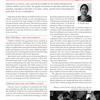Education in rural areas: A matter of right
Education must be available for all children through formal schools, whether rural or urban. The quality and content of education must have equal standards, regardless of diversities in location, culture, and the levels of development.
While we celebrate the universality of education it is necessary at the same time be appreciative of the specificities of the region in which the child is growing up. Rural education processes must be creative in integrating the experiences and richness of the society in the school curriculum. It must empower the child to understand the dynamics of rural society, its land use patterns and agriculture, and so on. Having said this, in many developing societies one is struck by the large numbers of children who do not attend schools in the rural areas. Their every day struggles while being out of school has an impact on the manner in which schools are actually run in the countryside. The issues of quality and content of education in rural schools is largely dependent on removing all barriers for enabling every child access schools.
Dr Shantha Sinha
Chairperson - National Commission for Protection of Child Rights
Founder MV Foundation
Hyderabad, Andra Pradesh, India
Shantha.Sinha@nic.in




